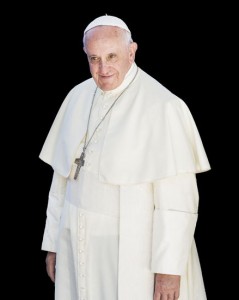Stop Applauding the Pope: A Word on the Misguided Praise from Progressives
 Photo by vstudios / 123RF
Photo by vstudios / 123RF One day I’ll wake up and the liberal love fest with Pope Francis will be over—but until that day comes, I want to make something clear: Pope Francis is not a good person. He might not look so bad cloaked in the shadow of his predecessor, Pope Benedict, but I urge you to look at him in the light. Gauged on his own, and gauged against other more progressive, tolerant, and intelligent social leaders, Francis is revealed to be little but the latest and shiniest vehicle through which the Vatican can push its oldest and dustiest doctrines. He should not be praised by progressives; he should not be adored by them; and in light of the recent publication of his encyclical on climate change (among other things), I say that he should not, under any circumstance, be taken as a credible or relevant source on anything that’s happening anywhere outside the high and gilded walls of his ancient Roman castle.
By some sorcery of PR, the Catholic Church has convinced a frightening number of progressives, humanists, and otherwise rational thinkers that Francis is one of their own—but this is a man who rejects gay marriage in fear of its potential to destroy the “traditional” family; a man who passionately supports, on theological grounds, and much like his predecessors, an international prohibition on birth control, even in poor and AIDS-ravaged countries; a man who has compared transgender people to nuclear weapons in their ability to wreak havoc on the “natural order of creation”; and a man who, in response to the Charlie Hebdo attack, victim-blamed the dead writers with the suggestion that free speech must end where criticism of religion begins. He is a man who, in the tradition of all popes before him, and through either indifference or intention, continues to incubate the epidemic of pedophilia that so plagues the ranks of his subordinates. I’ll say it again: Pope Francis is not a good person.
In the wake of the encyclical officially released last Thursday—an apparently profound document that has conservatives frothing at the mouth and liberals swooning with anime-hearts in their eyes—we should ask ourselves, why do we care? Why does anybody care what the pope has to say about anything? And more specifically, why do humanists, progressives, and secularists care what the pope has to say about science?
As you well know the Vatican didn’t apologize to Galileo until 1992—and to that point, I believe that any praise given to the pope’s scientific declarations does a grave disservice both to the scientific method and to those who genuinely employ it. In other words, Francis, that’s not how this works; you don’t get to cherry-pick scientific consensus when it suits your ideological agenda; you don’t get to uphold the veracity of scientific discoveries while still believing in virgin births and demonic possessions; you don’t get to refer to the data to prove one point while ignoring the data that proves others—say, like, that homosexuality is natural and harmless, or that birth control provides extraordinary benefits to the women of the poor—a community of people that this religious royalty, it seems, is only really concerned with as his rhetorical tool of choice.
Above all, Francis, you don’t get a pat on the back for finally observing and acknowledging something that rational people have already known about for decades; a lag in information that is especially embarrassing considering the pontifical claims about direct communication with the creator of the universe.
What, exactly, has Pope Francis said that hasn’t been said better, before and elsewhere? Which phrase caused this sudden liberal amnesia in regards to the Vatican’s 2000-year history of getting everything wrong in the worst possible ways? Which word was it that has somehow legitimized, in the eyes of a previously critical audience, the musings of out-of-touch old men clinging to even more irrelevant old books?
Maybe I missed it. Maybe it’s the degree to which this “scientific” encyclical is painted in religious rhetoric and bigoted jabs at humanistic values—a point that progressives again seem to be willingly glossing over—ignoring the part where Francis condemns abortion as a form of “population control,” and the part where, thrusting a cloaked dagger into the back of the LGBTQ community, he explains that in order to most fully accept “the entire world as a gift from the Father,” we must embrace our “femininity or masculinity,” accept “our bodies as God’s gift,” and stop trying to “cancel out sexual differences.”
Yes—what a modern, sophisticated, and tolerant man. Let us praise his courage.
Or rather, let’s ignore him—the more deserved response—and let’s, as a community, stop aiding in the perpetuation of the cultural myth that the Catholic Church is to be taken seriously. It’s true that, given his social and political clout, Francis’ proclamations can inspire otherwise indifferent people to action. But it’s also true that the only reason he has this clout—social, political, or otherwise—is because people continue to revere the intellectual output of the Vatican as if it were meaningful or relevant in any way. From a religious person this is expected—from a secularist, skeptic, atheist, or a humanist I see it as something morally indefensible; you bolster the power and credibility of an institution that has historically been and still currently is antagonistic to our every goal.
